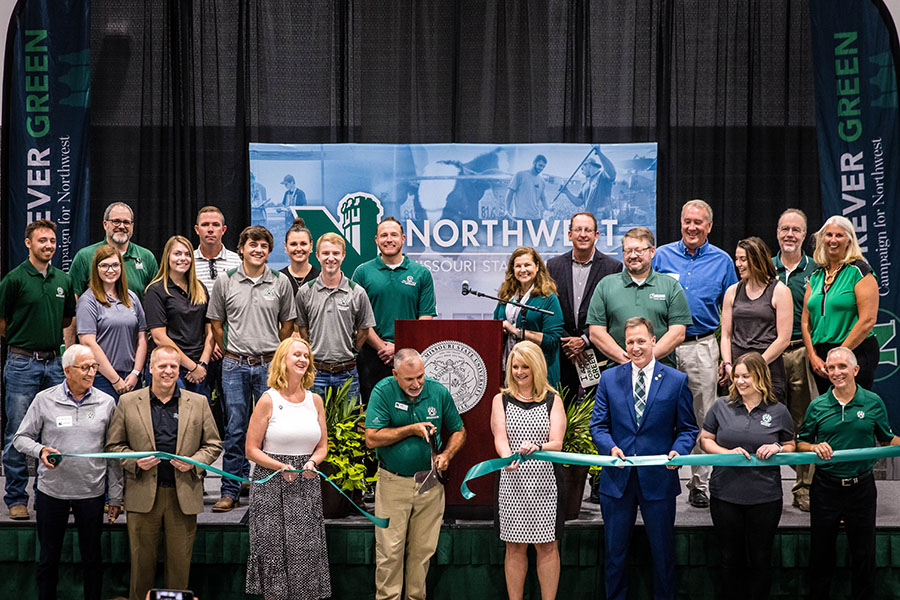
The Northwest community celebrated the opening of the Agricultural Learning Center Friday. Left to right In the first row are Dr. Bob Burrell, president of the Northwest Foundation; Scott Kuhlmeyer, director of capital programs; Mitzi Marchant, vice president of university advancement and executive director of the Northwest Foundation; Dr. Rod Barr, director of the School of Agricultural Sciences; Chris Chinn, director of the Missouri Department of Agriculture; Rep. Allen Andrews; Bailey Hendrickson, Student Senate president; and Northwest President Dr. John Jasinski. They are surrounded in the second row by Northwest agriculture students, faculty and staff as well as representatives of the city of Maryville, Nodaway County, E.L. Crawford Construction, Clark & Enersen, and the Northwest Foundation. (Photos by Todd Weddle/Northwest Missouri State University)
Northwest Missouri State University on Friday celebrated the opening of its Agricultural Learning Center, setting up a historic date in the institution’s lifespan that culminated later in the day with the finale of its Forever Green comprehensive fundraising campaign.
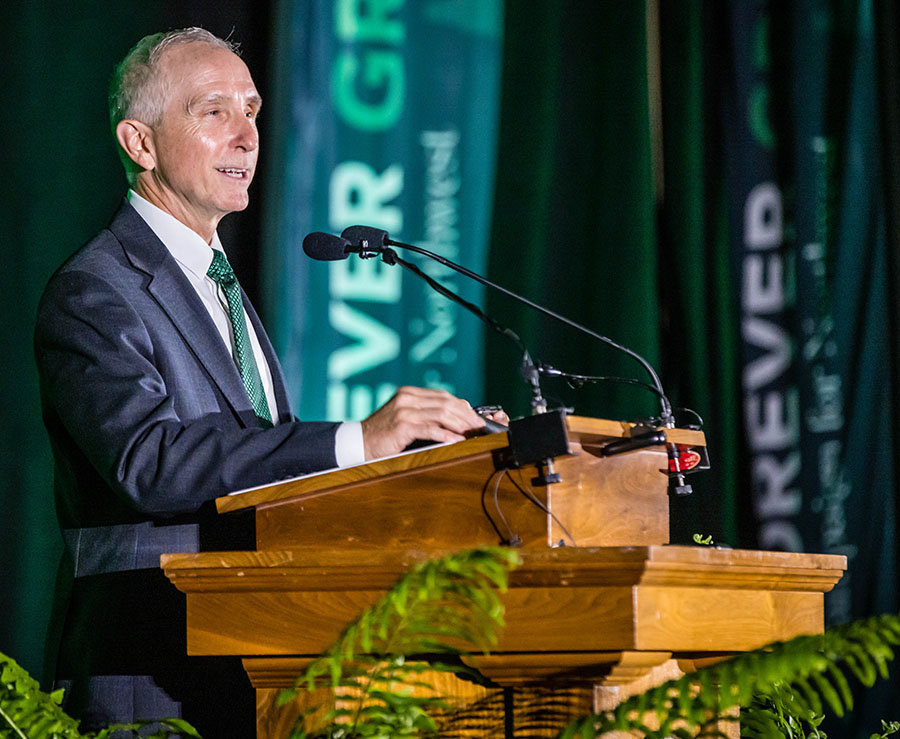
Northwest President Dr. John Jasinski addressed attendees of a Friday night celebration at the Hughes Fieldhouse.
Northwest announced during an evening celebration inside the Carl and Cheryl Hughes Fieldhouse – the campaign’s other building construction project – that it raised $55,026,782.
“We have momentum because of the enormously successful Forever Green campaign,” Northwest President Dr. John Jasinski said at the Friday night event as he thanked the donors and friends who provided support. “Northwest Missouri State is the little engine that does. We have a great amount of momentum and the love and the ability to not only dream but to achieve our dreams.”
An estimated 300 people filled the Agricultural Learning Center’s expo center Friday morning for its ribbon-cutting, joining displays of farm machinery and a pen with two calves representing the University’s Guernsey herd.
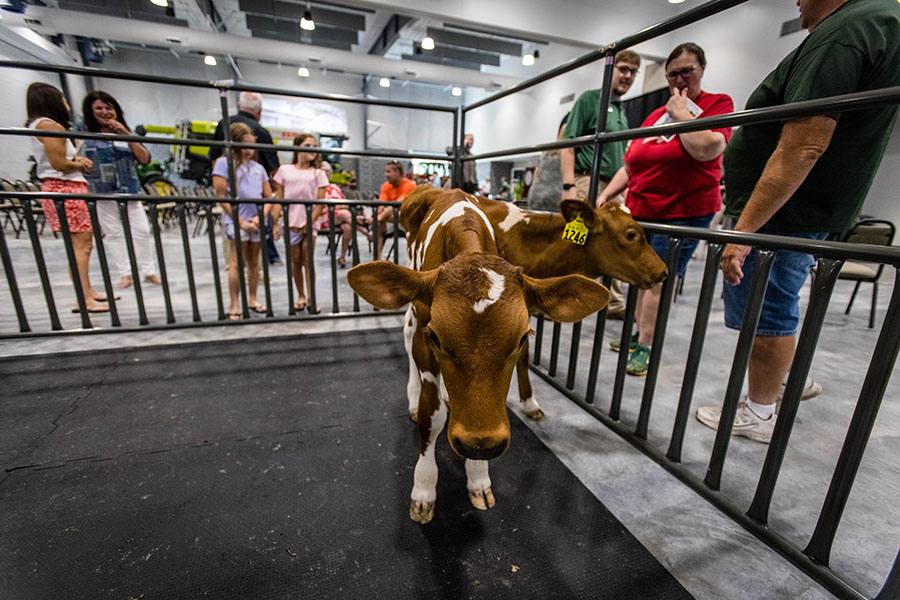
Northwest's Guernsey calves appeared at the Agricultural Learning Center's opening celebration.
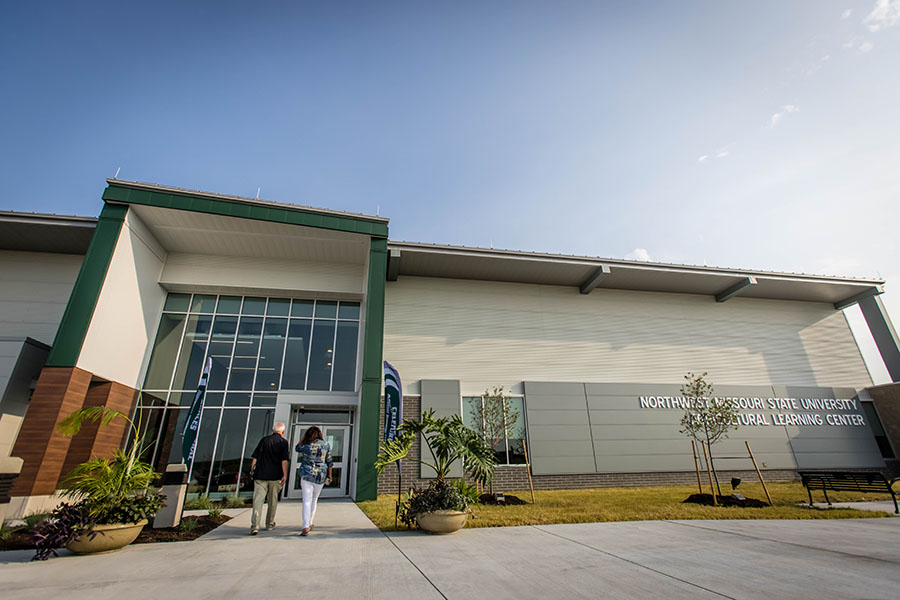
The 29,500-square-foot Agricultural Learning Center features laboratories, a kitchen, classrooms, study spaces and offices as well as a large exposition space and an outdoor education plaza.
Decades in the making, the new 29,500-square-foot multipurpose facility enhances the School of Agricultural Sciences and its curriculum, which today offers programs in agricultural business, agricultural education, agricultural media, agricultural science, agronomy and animal science.
To help the School meet enrollment and program growth, the Agricultural Learning Center features laboratories, a kitchen, classrooms, study spaces and offices as well as a large exposition space and an outdoor education plaza.
Additionally, the facility addresses infrastructure needs at the 448-acre R.T Wright Farm related to academic facilities, parking and farm production. It enables further innovation and partnerships while addressing best practices for the Northwest campus and agricultural sciences.
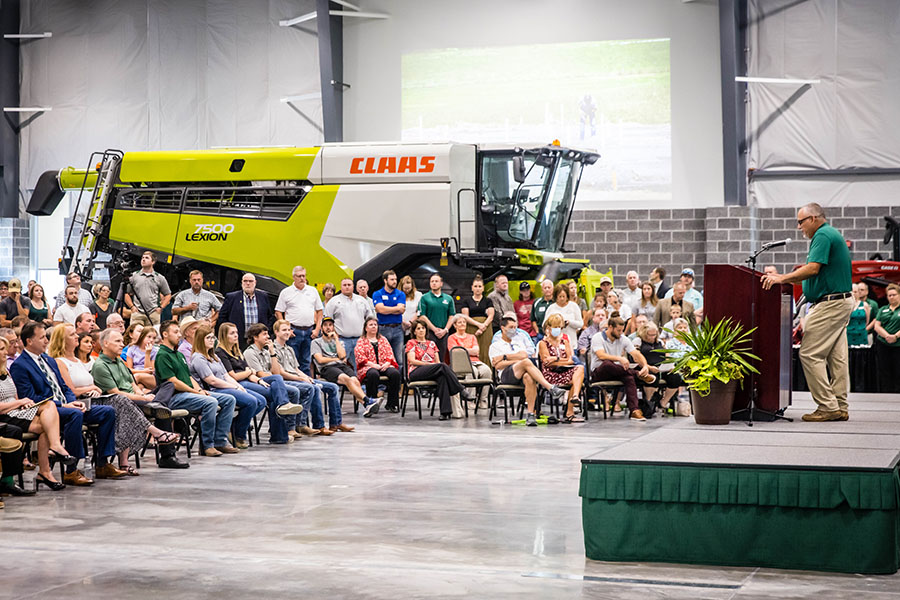
Dr. Rod Barr, the director of the School of Agricultural Sciences, addresses attendees of the Agricultural Learning Center's opening ceremony.
Reflecting on the University’s history as a leader in agriculture education and the work to bring the Agricultural Learning Center to reality, Dr. Rod Barr, the director of the School of Agricultural Sciences, said the facility represents two industries that are vital to the region – agriculture and education. He noted Northwest has offered agriculture courses since its founding as the Fifth District Normal School in 1905, and the agriculture department was established in 1916.
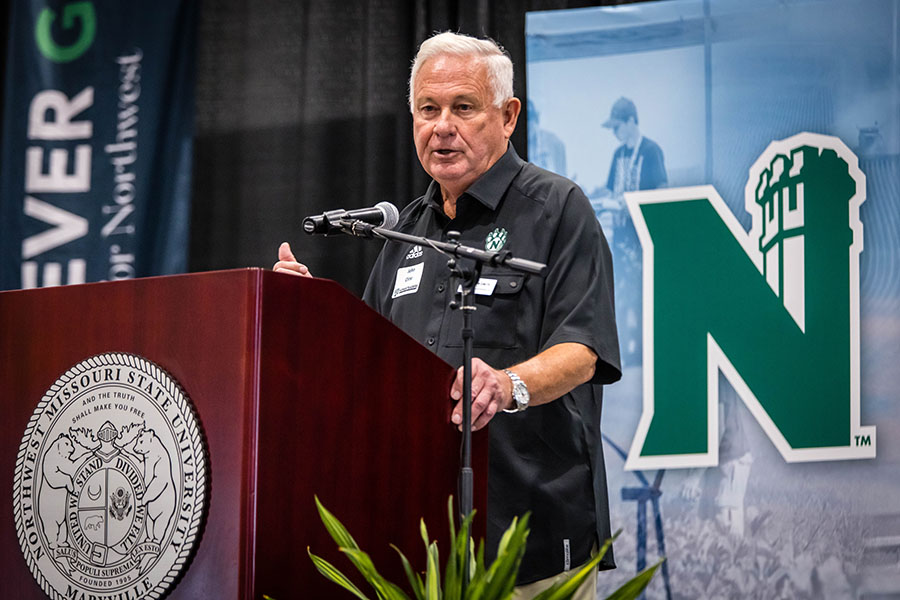
John Cline
Northwest established its Wright Farm, located north of the University campus alongside Highway 71, in 1971 after purchasing the farmland from the Cline family. John Cline, a 1975 alumnus and member of the Northwest Foundation Board of Directors whose parents owned the property, provided significant support for the Agricultural Learning Center. A new entry road to the farm is named Cline Family Farm Road.
“The farm has served as a living laboratory, providing opportunity for hands-on instruction,” Barr said, noting Northwest identified a need for academic space on the Wright Farm during the 1980s, and the idea for a multipurpose facility on the property gained traction around 2010. “The Agricultural Learning Center gives us the opportunity to impact every student at Northwest, those within the School of Agricultural Sciences as well as those in other disciplines. In addition, the facility provides the opportunity to serve the community, the region and the agricultural and food industry in ways that 10 years ago we could not imagine.”
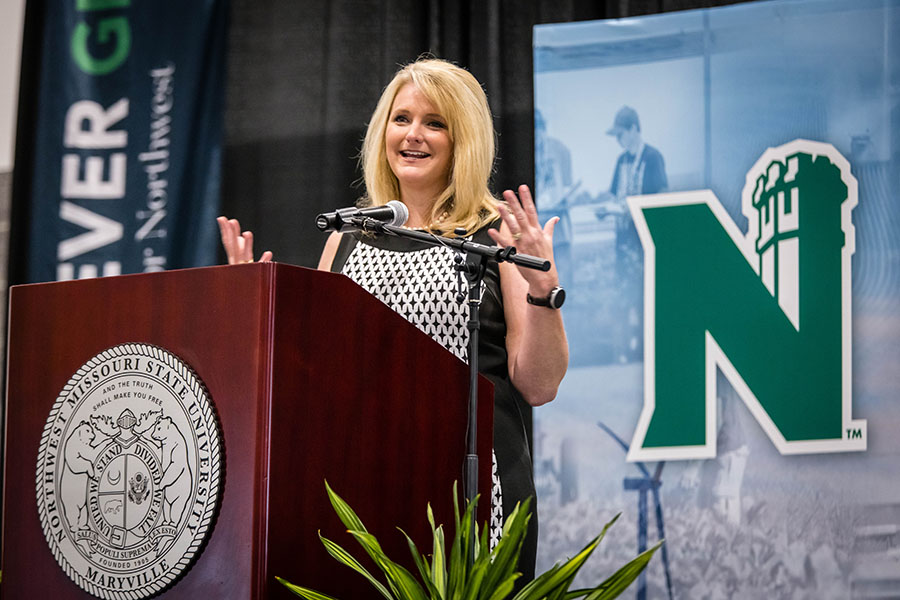
Chris Chinn
Touting the accolades of the state’s 100,000 farms and the high ranks of Missouri’s farming industry, Chris Chinn, director of the Missouri Department of Agriculture, praised Northwest and the region for its commitment to agriculture and to preparing students for future career paths in the field.
“This Agricultural Learning Center is going to give students the opportunity to find places in the industry where they can contribute to Missouri agriculture,” she said. “This facility is going to produce the next generation of high school agriculture teachers as well. Those teachers are really who start the passion and developing excitement for agriculture in their classroom, and so those teachers are going to have a great start when they come to Northwest Missouri.”
Chinn added, “I’m really excited to see the contributions that you’re going to bring to Missouri agriculture and the great start that your future leaders for agriculture are going to gain from this Agricultural Learning Center. I couldn’t be more proud of the work that happens here.”
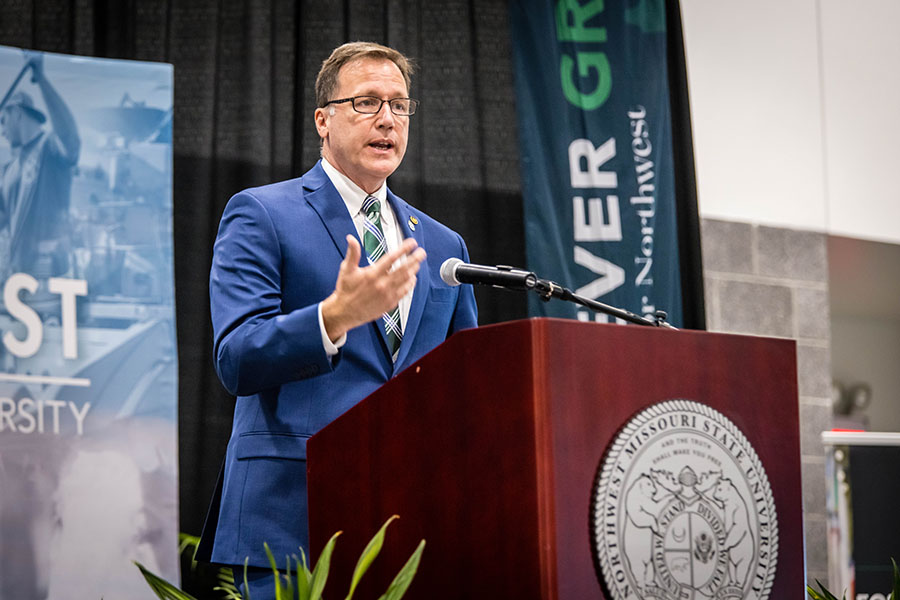
Allen Andrews
In his remarks, Rep. Allen Andrews, a 1989 graduate of Northwest, pondered the University’s strongest assets and successes during the past decade in academics and athletics. The driving force behind Northwest’s momentum and the development of the Agricultural Learning Center, he said, is the vision of the people who collaborated to bring the project to fruition.
“This is Northwest’s Ag Learning Center, a place that will prove to be an instrument for learning, for growing, for creating, for adapting and for dreaming of what can be,” Andrews said. “This is an exciting and a very monumental day for the future of Northwest Missouri State and all who pass through these doors, and it could not have happened without you. Never underestimate the impact that you’ve made.”
The University raised more than $6.5 million for the Agricultural Learning Center through the support of more than 200 individual gifts. Additionally, the Missouri General Assembly issued $2.5 million in state-appropriated funding for the construction. More than 40 public and private donors joined the University’s Homesteaders society, providing leading support with gifts of $25,000 or greater toward the project.
The Board of Regents authorized the University on March 19, 2020, to move forward with construction of the facility. The University subsequently awarded a construction contract to E.L. Crawford Construction, and ground was broken in April 2020. Clark & Enersen served as the architectural firm on the project, while SK Design Group provided civil engineering, and BRiC Partnership provided mechanical engineering.
On the day prior to the ribbon-cutting ceremony, Barr led a series of tours in the facility for donors, prospective students and current students.
“It was just amazing to see the reactions of some of those groups of people, the wows, the look in their eyes, and that’s fun for me today to see some of that response in this facility,” Barr said. “The Agricultural Learning Center will have a tremendous influence on student success for the School of Agricultural Sciences and beyond. It will help us recruit and educate the next generation of industry leaders.”
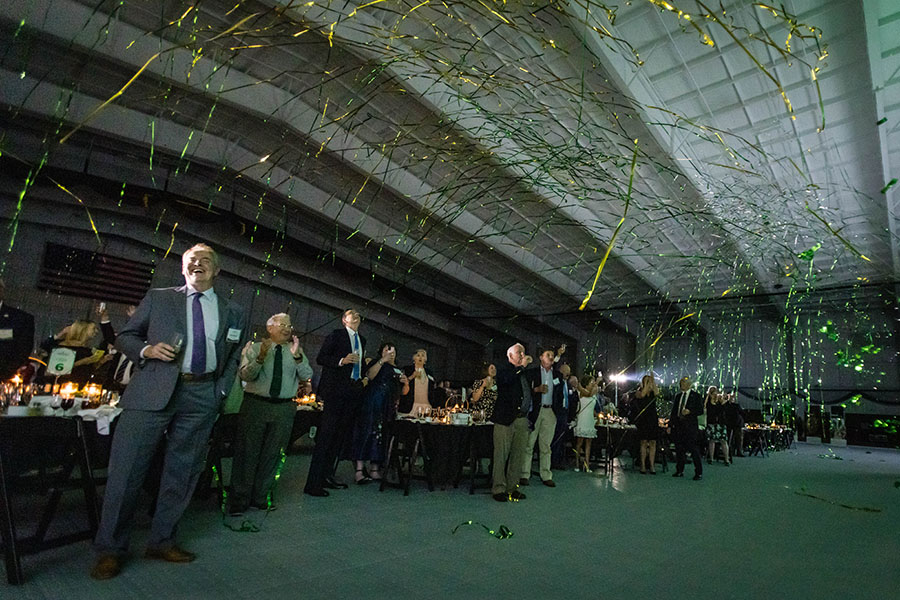
Streamers fell over attendees of a Friday night celebration at the Hughes Fieldhouse after the University announced its Forever Green campaign raised $55,026,782, exceeding its goal by more than $10 million.
Friday’s evening event coincided with the 50th anniversary of the Northwest Foundation’s establishment and served as a showcase of the significant philanthropic impacts on the University, bringing together donors, partners, volunteers and other members of the Northwest community.
“This culminates one of the most important eras in this University’s history,” Dr. Bob Burrell, the president of the Northwest Foundation Board of Directors and a 1970 alumnus, said.
Conceived and launched into a quiet phase in 2014, the Forever Green campaign sought to raise $45 million for initiatives centered on academic excellence, scholarships, student life, and other donor-directed gifts. More than 18,000 donors representing all 50 states, the District of Columbia and 12 international locations supported the campaign.
An early milestone of the campaign, the $21 million Hughes Fieldhouse opened in fall 2018 with leading support provided by the Carl and Cheryl Hughes family, Mel and Valorie Booth, the city of Maryville and Nodaway Valley Bank as “team captains” of the Founding 50, a group of donors giving $50,000 and greater to construct that facility.
Additionally, the campaign delivered the Dennis C. Dau Endowed Professorship in Instrumental Music, a first-of-its-kind gift in Northwest’s history to provide special recognition to a faculty member for continued exemplary service in their field. Support of diversity and inclusion initiatives also were part of the campaign, led by a $1 million cash gift and the establishment of the Karen L. Daniel Legacy Fund.
In all, the campaign funded 22 named gifts of more than $100,000 and established 66 scholarships. Ninety donors gave more than $100,000 throughout the campaign.
For more information about the Forever Green campaign and ways to make a gift in support of Northwest initiatives, visit www.nwmissouri.edu/ForeverGreen/ or contact the Office of University Advancement at 660.562.1248.